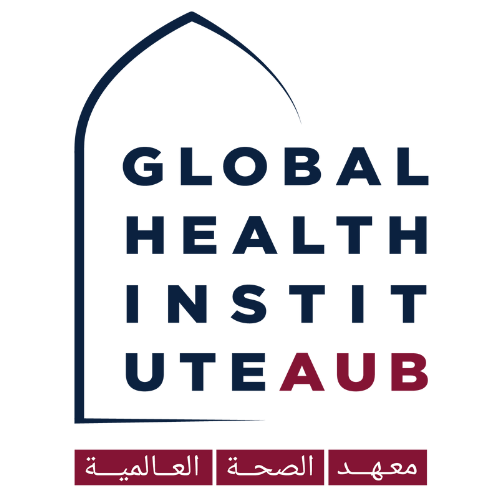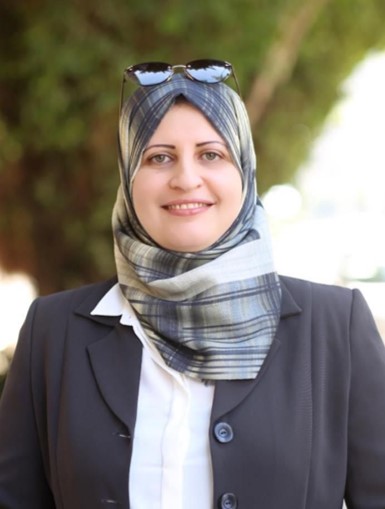


Reem Tawfeek Abu Shomar-Alyazouri
Nationality: Palestine
Site of Mentored Research: Palestine Professional
Background: Health Specialist
Current Position: Project Coordinator Unit/ Palestine Water Authority
Mentor(s): Aula Abbara, MBBS, DTMH, MD, Imperial College, United Kingdom
RESEARCH PROJECT
Project Title
Antimicrobial Resistant Bacteria in Water Samples at Health Care Setting in the Gaza Strip
Abstract
Background: Antimicrobial resistance (AMR) is a growing global phenomenon however, its link to Water, Sanitation and Hygiene (WASH) remains underexplored, particularly in healthcare facilities (HCFs) where humanitarian crises prevail.
Rationale: The study aimed to identify AMR bacteria in samples collected from WASH services in two hospitals in Gaza and to investigate the presence of AMR genes.
Methods: A hospital-based cross-sectional study to detect and identify antimicrobial resistance bacteria was conducted. Random samples from water, wastewater, soap, and surface swabs (n=345) were collected from Al-Shifa and European Gaza hospitals and screened for the presence Enterobacteriaceae, Pseudomonas, Enterococcus and Staphylococcus aureus. Antimicrobial susceptibility, ESBL production, Carbapenem resistance, and AMR genes were investigated.
Results: High levels of bacterial contamination was detected in water and surface swab samples with an overall percentage 34.1%. Of the total positive microbial growth, (35.7%) on m-Endo Agar, (25.2%) on Mannitol Salt Agar, (23.8%) on Cetrimide Agar; and (12.2%) on m-Enterococcus Agar. Twenty-two percent of identified Enterobacteriaceae was positive for ESBL and fourteen percent was positive for Modified Hodge test (MHT). Over 2/3 of isolated Enterobacteriaceae in water and wastewater samples found resistant to Amikacin, Ceftazidime, Ceftriaxone, and Imipenem. All Enterobacteriaceae isolates from swab samples were found to be resistant to Pipracillin-Tazopactam, Amikacin, Ceftazidime, and Ceftriaxone. The prevalence of ESBL genes among Enterobacteriaceae isolates were: 25% OXA, 19.4% SHV, 2.8% KPC, 66.7% TEM, 41.7% blaCTXM, and 5.6% blaCTXM-3. For Carbapenem resistant gene (MDM), the prevalence among Enterobacteriaceae was 11.1% and among Pseudomonas was 12.5%. The antibiotic susceptibility profile was also presented for Pseudomonas, Enterococcus and S. aureus.
Conclusion: The results underline the level of contamination with AMR bacteria in WASH samples and highlights the need to consider the safety of WASH service at HCFs as an essential aspect in the fight against the spread of AMR and interrupt nosocomial transmission.
OUTPUTS
CREEW REPORT
Reem’s project aimed to investigate the presence of AMR bacteria in samples collected from water, wastewater, and hygiene facilities at health care setting in the Gaza Strip in Palestine. The project yielded quantitative results highlighting the high level of contamination with AMR bacteria in the collected samples. The results sheds lights on the deteriorating health infrastructure in conflict and the need to build capacity for safeguarding against AMR at health care facilities.
BLOG ARTICLE
Anti-microbial resistance and the emergence of ‘superbugs’ is occurring throughout the world. Prolonged and intense conflicts can create a unique set of social and environmental conditions that intensify the risk of emergence. Studies suggest that urban areas affected by prolonged conflict are prime sites for bacteria to evolve resistance to antibiotics. These include the Gaza pilot study that was completed in March 2021 and examined the connection between AMR and the provision of water, sanitation and hygiene (WASH) services. The results of this study underlined the level of contamination with AMR bacteria in samples collected from WASH services at healthcare settings and highlighted the need to consider the safety of WASH service provided at health care facilities as an essential aspect in the fight against the spread of AMR.
Antimicrobial Resistant Bacteria in Water Samples at Health Care Setting in the Gaza Strip
- Format: Research Paper
- Status: Under Review



